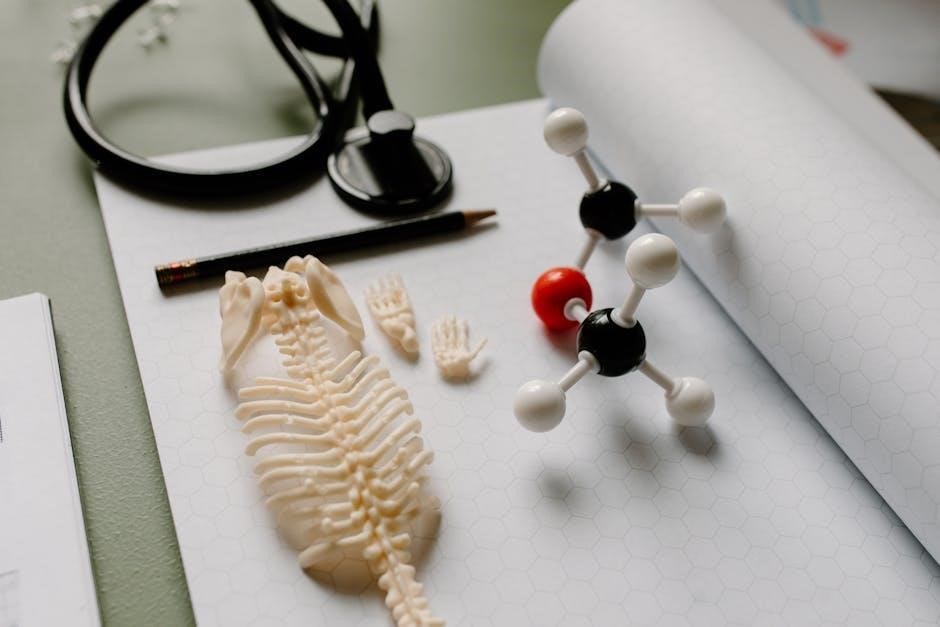nursing study guide
A nursing study guide is a comprehensive resource designed to support nursing students and professionals in mastering essential concepts, skills, and practices. It covers foundational topics, clinical procedures, and exam preparation, serving as a valuable tool for academic and career success in the nursing field.
Importance of a Nursing Study Guide
A nursing study guide is an essential resource for students and professionals, offering a structured approach to mastering complex nursing concepts. It streamlines study processes, ensuring efficient learning and retention of critical information. By organizing key topics such as anatomy, pharmacology, and patient assessment, the guide helps learners focus on high-priority areas. Additionally, it reinforces understanding of clinical skills and prepares individuals for licensing exams like the NCLEX-RN. The guide also aids in bridging the gap between theoretical knowledge and practical application, making it indispensable for both academic success and career advancement in the nursing field. Its comprehensive nature ensures that users are well-prepared for the demands of modern healthcare;
Key Features of an Effective Nursing Study Guide
An effective nursing study guide should include clear, concise content that covers a wide range of nursing topics, from foundational subjects to advanced clinical skills. It should provide structured chapters with detailed explanations, case studies, and practice questions to enhance understanding and retention. Visual aids like diagrams and charts are essential for complex topics such as anatomy and pharmacology. Additionally, the guide should offer practical tips for exam preparation, including strategies for the NCLEX-RN. Accessibility is another key feature, with digital versions allowing for easy access on multiple devices. A good guide also incorporates interactive elements like quizzes and mnemonics to engage learners and facilitate active studying. These features collectively ensure that the guide is both comprehensive and user-friendly, meeting the diverse needs of nursing students and professionals.

Foundational Nursing Topics
Foundational nursing topics include medical terminology, anatomy, physiology, and understanding vital signs. These basics are crucial for diagnosing conditions and providing effective patient care in all nursing settings.
Medical Terminology: The Basics
Medical terminology forms the backbone of effective communication in healthcare. It involves understanding prefixes, suffixes, and root words to decipher medical terms. Nursing students must master this to document patient histories, diagnoses, and treatments accurately. Resources like the QuickStudy Laminated Reference Guide and comprehensive textbooks provide structured learning. These tools break down complex terms, making them easier to grasp. Proficiency in medical terminology enhances critical thinking and ensures clear communication among healthcare professionals. It is a fundamental skill that supports accurate documentation and effective patient care. By studying these basics, nurses can build a strong foundation for their practice and excel in clinical settings.
Anatomy and Physiology Essentials
Anatomy and physiology are cornerstone subjects for nursing students, providing a detailed understanding of the human body’s structure and functions. These disciplines enable nurses to comprehend how body systems interact and respond to health conditions. Study guides often include diagrams, charts, and interactive tools to simplify complex concepts. Mastering these basics is crucial for assessing patients, identifying abnormalities, and implementing appropriate care. Resources like textbooks and online tutorials offer comprehensive coverage of topics such as the skeletal, muscular, and nervous systems. Understanding anatomy and physiology also underpins pharmacological interventions and surgical procedures. By grasping these fundamentals, nurses can deliver informed, effective care tailored to individual patient needs, ensuring optimal health outcomes and enhancing clinical decision-making skills.
Understanding Vital Signs

Understanding vital signs is a fundamental skill for nurses, as they provide critical insights into a patient’s health status. Vital signs include body temperature, pulse rate, respiratory rate, blood pressure, and oxygen saturation. These measurements help nurses assess a patient’s baseline health, detect deviations from normal, and monitor responses to treatments. Study guides often emphasize the importance of accurate measurement techniques and interpretation. For example, an elevated temperature may indicate infection, while abnormal blood pressure readings can signal cardiovascular issues. Mastering vital sign assessment enables nurses to make informed clinical decisions, prioritize care, and ensure timely interventions. Resources like charts, practice exercises, and case studies in study guides can reinforce learning and improve proficiency in this essential nursing skill.

Core Nursing Subjects
Core nursing subjects include medical-surgical nursing, pharmacology, and patient care. Study guides provide essential knowledge and exam preparation, aiding nurses in clinical practice and growth.
Fundamentals of Nursing Practice
Fundamentals of nursing practice form the backbone of patient care, emphasizing safety, compassion, and evidence-based interventions. Key components include patient assessment, vital sign measurement, and communication skills. These principles ensure holistic care, addressing physical, emotional, and social needs. Study guides highlight infection control, medication administration, and wound care as critical skills. Ethical practices, such as confidentiality and patient rights, are also central. Mastery of these basics enables nurses to provide high-quality care across diverse settings, from hospitals to community health. By focusing on foundational skills, nursing students build a solid framework for advancing their careers and delivering optimal patient outcomes. These essentials are repeatedly emphasized in recommended study materials and resources.
Medical-Surgical Nursing Overview
Medical-surgical nursing focuses on caring for adult patients with various medical conditions and surgical needs. It encompasses pre- and post-operative care, chronic disease management, and acute illness treatment. Nurses in this field must possess strong assessment and critical thinking skills to monitor patients’ conditions and respond to changes. Key topics include wound care, pain management, and medication administration. Study guides often highlight pharmacology, surgical procedures, and patient education as essential areas of focus. These resources also emphasize the importance of understanding lab results and diagnostic tests to provide evidence-based care. Mastery of medical-surgical nursing is foundational for many clinical settings, making it a priority in nursing education and practice.
Pharmacology Basics for Nurses
Pharmacology is a critical component of nursing practice, focusing on the study of medications, their effects, and their safe administration. Nurses must understand drug classifications, dosages, side effects, and contraindications to ensure patient safety. Key topics include understanding pharmacokinetics (how drugs move through the body) and pharmacodynamics (drug effects). Study guides emphasize medication administration rights (right patient, drug, dose, route, and time) and the importance of patient education. Nurses also need to stay updated on new medications and evidence-based practices. Pharmacology basics are often reinforced through practice questions and case studies in nursing study guides, helping students master complex drug therapies and prepare for clinical scenarios.

Nursing Skills and Procedures
Nursing skills and procedures form the practical foundation of patient care. They include vital sign assessment, medication administration, wound care, and diagnostic testing, ensuring safe and effective practice.
Head-to-Toe Patient Assessment
A head-to-toe patient assessment is a systematic method of evaluating a patient’s physical condition from the top of the head to the toes. It is a critical skill for nurses, ensuring no detail is overlooked. The assessment typically includes evaluating vital signs, inspecting the skin, and examining major systems such as respiratory, cardiovascular, neurological, gastrointestinal, and musculoskeletal. Nurses use tools like stethoscopes, blood pressure cuffs, and thermometers. A well-organized assessment template helps streamline the process, ensuring accuracy and efficiency. This approach not only aids in identifying abnormalities but also provides a baseline for future comparisons. Regular practice and documentation are essential for mastering this skill, which is vital for effective patient care and decision-making in clinical settings.
Diagnostic and Lab Tests
Diagnostic and lab tests are essential tools for nurses to identify and monitor health conditions. Common tests include complete blood counts, blood glucose levels, and urinalyses. Nurses must understand the purpose, procedure, and interpretation of these tests. Accurate documentation and communication of results are critical for patient care. Study guides often provide detailed explanations and practice questions to reinforce understanding. Nurses should also be aware of preparation requirements, such as fasting, and patient education needs. Staying updated on new diagnostic techniques ensures effective care and informed decision-making, making diagnostic and lab tests a cornerstone of nursing practice.
Mastering Nursing Procedures
Mastering nursing procedures is essential for delivering safe and effective patient care. A nursing study guide provides detailed step-by-step instructions for common procedures, such as administering medications, performing wound care, and conducting patient assessments. These guides often include diagrams, checklists, and practice questions to reinforce learning. Understanding the rationale behind each procedure ensures nurses can apply their knowledge in various clinical scenarios. Many study guides also cover emergency procedures, such as CPR and managing adverse reactions, which are critical for patient safety. By practicing and reviewing these procedures, nurses can build confidence and competence, making them proficient in providing high-quality care. A comprehensive study guide is an invaluable resource for both students and practicing nurses.

Maternal and Child Health Nursing
A nursing study guide covers maternal health, child development, and pediatric care essentials, offering comprehensive resources for nurses to provide skilled care across these critical areas.
Maternal Health Fundamentals
Maternal health fundamentals are critical for nurses, encompassing prenatal, antenatal, and postnatal care. A nursing study guide emphasizes understanding reproductive anatomy, pregnancy stages, and complications like gestational diabetes and hypertension. It also covers labor and delivery techniques, postpartum recovery, and breastfeeding support. Nurses learn to assess vital signs, monitor fetal development, and provide emotional and educational support to expectant mothers. These guides often include case studies and practice questions to reinforce learning, ensuring nurses are well-prepared to address maternal health challenges and promote healthy outcomes for mothers and newborns.
Child Health and Development
Child health and development are central to nursing care, focusing on promoting wellness and addressing pediatric needs. A nursing study guide covers growth milestones, developmental stages, and age-specific assessments. It emphasizes understanding immunization schedules, nutrition, and safety measures to prevent injuries. Nurses learn to identify delayed development and manage common pediatric conditions, such as asthma or allergies. The guide also explores emotional and psychological growth, ensuring holistic care. Practical tips and case studies help nurses apply knowledge effectively, making it an essential resource for providing high-quality care to children and supporting their overall well-being.
Pediatric Nursing Care
Pediatric nursing care focuses on providing specialized, age-appropriate care to children, addressing their unique physical, emotional, and developmental needs. A nursing study guide emphasizes assessment techniques for infants, children, and adolescents, including pain evaluation and developmental screening. It covers common pediatric conditions, such as respiratory infections and childhood allergies, and outlines evidence-based interventions. The guide also highlights communication strategies to engage children and their families, ensuring trust and cooperation. Additionally, it addresses safety measures, such as medication administration and injury prevention, tailored to different age groups. By equipping nurses with practical knowledge, the study guide supports optimal care for children, fostering healthy growth and development.

NCLEX-RN Exam Preparation
A nursing study guide for NCLEX-RN includes practice questions, test-taking strategies, and a review of critical concepts to ensure readiness for the licensure exam.
Understanding the NCLEX-RN Format
Understanding the NCLEX-RN format is crucial for success. The exam consists of multiple-choice questions, drag-and-drop items, and hot spot questions. It adapts to the test-taker’s ability, with questions increasing or decreasing in difficulty based on previous answers. The test includes a minimum of 75 questions and a maximum of 265, with a five-hour time limit. A comprehensive nursing study guide helps familiarize students with this format, ensuring they are prepared for the variety of question types and the adaptive testing style. This knowledge boosts confidence and improves time management during the exam.
Effective NCLEX Study Strategies
Effective NCLEX study strategies involve a combination of active learning and structured planning. Start by breaking down content into manageable topics, focusing on high-priority areas like pharmacology and medical-surgical nursing. Utilize active learning techniques such as flashcards, mnemonics, and practice questions to reinforce retention. Incorporate timed simulations to mimic exam conditions, improving time management and reducing anxiety. Leverage comprehensive nursing study guides and online resources for targeted review. Prioritize understanding over memorization, and seek clarity on weak areas through detailed rationales; Consistent practice and regular review are key to building confidence and mastery. Stay organized, set realistic goals, and maintain a balanced study routine to ensure long-term success.
Practice Questions and Vocabulary
Mastering practice questions and vocabulary is crucial for nursing students preparing for exams like the NCLEX-RN. Utilize flashcards and online resources to build a strong foundation in medical terminology and key concepts. Practice questions help identify knowledge gaps and improve critical thinking. Focus on understanding rationales behind answers to enhance learning. Incorporate diverse question types, such as multiple-choice and scenario-based problems, to simulate real exam conditions. Regularly review and test yourself on topics like pharmacology, anatomy, and patient care. Effective vocabulary building ensures clarity in communication and accuracy in patient assessments. Leverage study guides and textbooks for comprehensive practice sets tailored to nursing exams. Consistent practice strengthens retention and confidence, essential for success in nursing school and beyond.

Nursing School Survival Tips
Stay organized with planners, prioritize tasks, and maintain a healthy work-life balance. Utilize effective study strategies, seek support from peers, and stay motivated throughout your journey.
Time Management for Nursing Students
Effective time management is crucial for nursing students to balance academic demands, clinical rotations, and personal life. Create a structured study schedule, prioritizing tasks based on urgency and importance. Use planners or digital tools to organize assignments, lecture notes, and exam preparations. Allocate specific time blocks for studying, reviewing notes, and practicing clinical skills. Avoid procrastination by breaking tasks into manageable chunks and setting realistic goals. Incorporate regular breaks to maintain focus and reduce burnout. Communicate with instructors and peers for support when needed. By mastering time management, students can efficiently navigate the rigors of nursing school, ensuring success in both theoretical and practical aspects of their training.
Effective Note-Taking Strategies
Effective note-taking is a cornerstone of success for nursing students, enabling them to capture and retain critical information. Use structured methods like the Cornell Method or mind mapping to organize content. Highlight key terms, concepts, and procedures to emphasize important details. Develop a personal shorthand to streamline note-taking during lectures or clinical rotations. Review and expand notes within 24 hours to enhance retention. Summarize complex ideas in your own words to reinforce understanding. Incorporate diagrams or flowcharts for visual learners. Use mnemonics or memory aids to remember complex processes. Regularly revise and organize notes to prepare for exams. By mastering these strategies, nursing students can efficiently manage the vast amount of information and perform better academically and clinically.
Staying Organized in Nursing School
Staying organized is crucial for success in nursing school, where managing multiple responsibilities, assignments, and clinical rotations can be overwhelming. Create a detailed schedule to allocate time for studying, attending classes, and completing tasks. Use digital or physical planners, calendars, or task management apps to keep track of deadlines and priorities. Break down large assignments into smaller, manageable steps to avoid last-minute stress. Organize study materials, such as notes, handouts, and textbooks, into clearly labeled folders or digital files. Utilize tools like flashcards or concept maps to review key concepts efficiently. Set specific goals for each study session to maintain focus and productivity. By implementing these strategies, nursing students can maintain a structured approach to their education and reduce stress.

Additional Nursing Resources
Explore recommended textbooks, online study guides, and visual tools like Picmonic for interactive learning. Utilize resources such as QuickStudy laminated guides and comprehensive nursing notes for exam success.
Recommended Nursing Textbooks
Essential nursing textbooks include Study Guide for Essentials of Nursing Research and Medical Terminology: The Basics QuickStudy Laminated Reference Guide by Corinne Linton M.D. These resources provide in-depth knowledge on key nursing concepts, medical terms, and research principles. Additionally, Fundamentals of Nursing Study Guide and NCLEX-RN Study Guide are highly recommended for exam preparation. These textbooks offer comprehensive coverage of nursing practices, pharmacology, and patient care strategies. They are designed to help students master critical skills and prepare for licensing exams. Investing in these textbooks ensures a strong foundation for both academic success and professional growth in the nursing field.
Online Nursing Study Guides
Online nursing study guides offer accessible and flexible learning resources for students and professionals. Platforms provide detailed notes, diagnostic tests, and pharmacology guides, enhancing understanding of complex topics. Tools like Picmonic use mnemonics and interactive quizzes for effective learning. These guides cover anatomy, physiology, and maternal health, ensuring comprehensive preparation. Many resources are available 24/7, making them ideal for busy schedules. They often include practice questions and rationales to aid exam preparation. Visual tools and customizable study plans further support learning. Online guides are cost-effective and regularly updated, ensuring relevance. They are invaluable for mastering nursing concepts and excelling in clinical practice, making them a popular choice among nursing students worldwide.
Visual Learning Tools for Nurses
Visual learning tools are essential for nurses to grasp complex concepts quickly. Platforms like Picmonic offer interactive mnemonics and quizzes, making topics like anatomy and pharmacology easier to understand. Videos, diagrams, and infographics provide clear representations of medical procedures and patient assessments. Tools such as head-to-toe assessment templates help nurses organize and visualize patient data efficiently. Flashcards and concept maps are also popular for reinforcing key terms and relationships. Additionally, laminated reference guides, like those for medical terminology, serve as handy visual aids. These tools are accessible online or via mobile apps, allowing nurses to study anytime, anywhere. They enhance retention, simplify learning, and are particularly useful for preparing for exams like the NCLEX-RN, ensuring nurses are well-equipped for clinical practice.

Nursing Career Development
Trusted nursing study guides offer comprehensive resources for career development, covering core information from nursing school to NCLEX-RN prep, empowering professionals for long-term success.
Nursing Specializations
Nursing specializations allow professionals to focus on specific patient populations or care areas, such as pediatric, geriatric, or critical care nursing. These fields require tailored knowledge and skills, which can be effectively acquired through dedicated nursing study guides. Resources like the Ultimate Nursing School Study Guide and NCLEX-RN Exam Preparation materials provide in-depth insights into various specialties, helping nurses excel in their chosen areas. Trusted study guides also cover essential topics such as pharmacology, anatomy, and patient assessment, ensuring a strong foundation for specialized practice. With comprehensive tools and focused learning strategies, nurses can confidently pursue their desired specializations and deliver high-quality, patient-centered care;
Building a Nursing Career
Building a nursing career requires a strategic approach, starting with a strong educational foundation and continuous skill development. Utilizing a nursing study guide can help aspiring nurses master key concepts and stay prepared for exams like the NCLEX-RN. These resources often include practice questions, case studies, and essential vocabulary, ensuring a solid understanding of nursing practices. Additionally, many guides offer insights into specialized fields, such as pediatric or geriatric care, allowing nurses to explore areas of interest. Staying organized and focused during studies is crucial, and tools like the Ultimate Nursing School Study Guide provide structured learning paths. By leveraging these resources, nurses can build confidence, enhance their skills, and pave the way for a successful and fulfilling career in healthcare.
Continuing Education for Nurses
Continuing education is vital for nurses to stay updated on the latest medical advancements and best practices. A nursing study guide often includes resources for lifelong learning, such as online courses, webinars, and workshops. These tools help nurses expand their knowledge in specialized areas like pharmacology, patient assessment, and critical care. Many study guides also offer access to interactive quizzes and case studies, making it easier for professionals to refresh their skills. By leveraging these educational resources, nurses can enhance their expertise, improve patient outcomes, and advance their careers. Continuous learning ensures that nurses remain competent and adaptable in a rapidly evolving healthcare environment, fostering professional growth and excellence.
Final Tips for Nursing Students
To excel in nursing school, stay organized and prioritize tasks effectively. Utilize visual learning tools and practice regularly with NCLEX-style questions. Seek support from peers or mentors when needed. Stay positive and maintain a healthy work-life balance to avoid burnout. Regularly review notes and study guides to reinforce key concepts. Engage in active learning through case studies and simulations to apply theoretical knowledge. Lastly, remain motivated by setting achievable goals and celebrating progress. By following these strategies, nursing students can build a strong foundation for both academic success and a fulfilling nursing career.
Staying Motivated in Nursing School
Staying motivated in nursing school requires setting clear, achievable goals and celebrating progress. Surround yourself with supportive peers and mentors who encourage your growth. Engage in active learning techniques, such as group discussions and hands-on practice, to stay engaged. Regular breaks and self-care practices can help prevent burnout. Visualize your future as a nurse to remind yourself of your purpose. Utilize resources like study guides and online tools to stay organized and confident. Lastly, embrace challenges as opportunities to learn and improve. By maintaining a positive mindset and proactive approach, nursing students can overcome obstacles and achieve long-term success in their studies and future careers.
Long-Term Success in Nursing
Long-term success in nursing involves continuous learning, professional growth, and a commitment to patient-centered care. Nurses should stay updated on medical advancements through ongoing education and certifications. Building strong interpersonal skills and fostering meaningful connections with patients and colleagues can enhance career satisfaction. Seeking mentorship and leadership opportunities helps in advancing your career. Prioritizing work-life balance and self-care is essential to avoid burnout and maintain resilience. Engaging in professional organizations and networking can open doors to new opportunities. By staying adaptable and embracing lifelong learning, nurses can thrive in their careers and make a lasting impact in healthcare. Dedication and passion for the profession are key to achieving long-term success and fulfillment in nursing.
